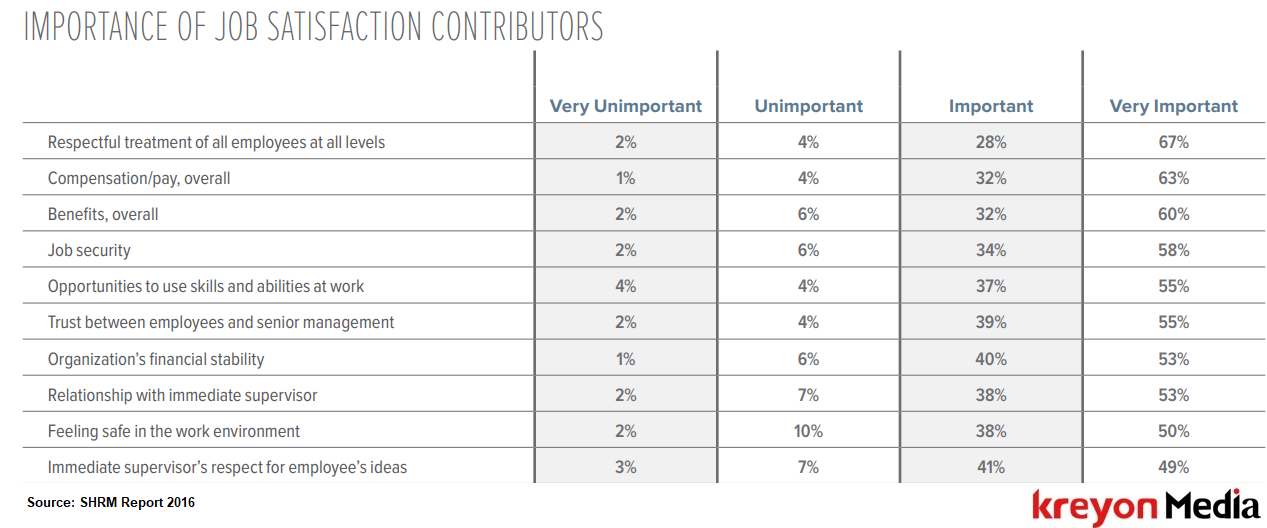
Job satisfaction is gaining prominence for companies and its employees around the world. Nothing matters more to employees than being in a job where they feel they are truly making a difference, adding value to themselves and the organisation. Job satisfaction is the new frontier for the employers who want to build a loyal workforce that is engaged in world transforming products & services.
While the pandemic has allowed employees to work from home. Many have started missing the office environment and their work. Employers are looking at job satisfaction levels among employees to retain them longer. Higher job satisfaction leads to lower attrition and increases competitive advantage for companies.
Work Relationships for Job Satisfaction

Research shows that the most important thing for job satisfaction is the relationship with people you are working with. Your colleagues and boss are important for your job satisfaction.
“To be satisfied with a job, you don’t have to worry too much about finding a perfect fit for your interests because we know other things matter too,” according to Levin Hoff, an assistant professor of psychology at Houston University.
He further elaborates, “As long as it’s something you don’t hate doing, you may find yourself very satisfied if you have a good supervisor, like your coworkers, and are treated fairly by your organization.”
Interest & Job Performance
When your focus is on the things you are doing, you will naturally excel at them. It helps you improve your performance, which leads to increase in pay and promotions. “Being interested in your work seems more important for job performance and the downstream consequences of performing well, like raises or promotions,” says Hoff.
Hoff and his team have conducted a study by analysing 39,600 interviews over the course of 65 years. The study was conducted using data from 1949 to 2016.
“In popular career guidance literature, it is widely assumed that interest fit is important for job satisfaction,” Hoffman says.
“Our results show that people who are more interested in their jobs tend to be slightly more satisfied, but interest assessments are more useful for guiding people towards jobs in which they will perform better and make more money.”
The study shows a strong correlation between interest and job performance. When people are doing things they love, they can often go the extra mile to create excellence. They also perform better, get promoted and make more money when the job interests them.
Job Satisfaction Factors
 As organisations are looking to improve on the job satisfaction scores, a study done by Society for Human Resource Management examined 43 aspects of job satisfaction and 37 factors for employee engagement. The key findings and contributors to satisfaction are as follows:
As organisations are looking to improve on the job satisfaction scores, a study done by Society for Human Resource Management examined 43 aspects of job satisfaction and 37 factors for employee engagement. The key findings and contributors to satisfaction are as follows:
Respect
Respect for employees at all levels was cited as the most important factor to their job satisfaction. 67% of the respondents in the SHRM report cited this as very important for job satisfaction. When employees at all levels are respected and embraced, it creates a winning culture in companies.
Compensation
Compensation is the second highest factor contributor to job satisfaction. As many as 63% employees cited good compensation very important for their job satisfaction. Competitive pay helps employees lead a financially secure life. It helps them focus on their work and not look for jobs elsewhere. It is also an important metric for making employees feel valued & part of the organisation.
Overall Benefits
The overall benefits of employment were rated by 60% employees as very important to job satisfaction. Today, organisations are coming up with innovative policies for keeping their employees happy. The benefits and policies are driven to attract talented people and keep them engaged at work.
Job Security
The job security was rated by 58% employees as very important to their job satisfaction. The job security is even more important during turbulent times and transitions like the pandemic. Employers that exhibit care and job security for their teams are able to earn their loyalty for a longer period compared to those that don’t.
Trust
The trust between employees and senior management is among the top five factors for job satisfaction. 55% of the employees rated trust between employees and their senior management as very important. Given the uncertainties of the workplace, it becomes paramount for senior management to build stronger trust with their employees.
Skills & Abilities

Opportunities to use your skills and abilities at work was the sixth factor contributing to job satisfaction. 55% of employees rated it a very important factor. Employee growth is dependent on their abilities to develop new skills and abilities. The organisations that provide opportunities for employees to showcase their skills and abilities help them grow and develop. Employees excel when they are challenged and given freedom to show their skills and talent.
Higher job satisfaction will be an important metric to build the future of companies. The remote working options and automation is creating flexibility for employees as well as organisations. Working with the first choice employers often brings out greater productivity and best results for employees. They spend more time engaged in their work and do things that add tremendous value.
The companies that invest in job satisfaction and keeping employees happy tend to attract quality talent. They are able to reduce their employee turnover, increase productivity, profits and loyalty. When the job satisfaction is high, employees want to be part of the company’s mission and growth. They feel connected and contribute to the organisation’s long term success.







